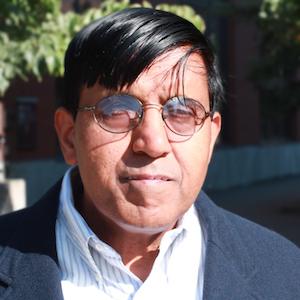Sushil Oswal
Job Title
Professor, Interdisciplinary Arts and Sciences, UW Tacoma
Profile Photo
Image

Email Address
Dr. Sushil K. Oswal is a Professor of Human-Centered Design in the School of Interdisciplinary Arts and Sciences and an Affiliate Associate Professor in the Disability Studies Program. The broad focus of Dr. Oswal’s interdisciplinary research is on the institutional questions of equity and inclusion in the employment of technology in the knowledge industry in the global north. He addresses these questions both at the technical and policy levels from the perspective of disability studies since we lack infrastructures for disability access at this time and policy and technology are intertwined factors behind the current state of inaccessibility. Dr. Oswal’s research has encompassed accessibility issues in web design, digital library databases, self-service kiosks, learning management systems, and some of his theoretical work is directly placed in the field of Disability Studies. Both the theoretical and applied aspects of his research cover human-computer interactions; interaction design as it relates to participation of oppressed groups in the knowledge economy, particularly with disabilities; and studying the nature and quality of interaction design for ICT development in the rural, global south. He is also the founding editor of the Western ABC Bulletin.
Dr. Oswal’s emerging theoretical work tackles with the critical questions of inclusion of disabled users in the design process as equal stakeholders who possess the embodied knowledge of the spatio-temporal dimensions of disability when it couples with technologies for access through alternative modalities of access—such as, interactive text to speech systems packaged as screen readers and refreshable Braille arrays and other haptic devices, multimodal input and output systems found in common smart phones, and the ubiquitous self-service digital kiosks. The traction points for such research lie in how the diverse dimensions of these technology interactions produce and reproduce the peculiar contexts of use and the functional and aesthetic values disabled users seek in these technologies and design interactions what he calls, disability usability.
Among Dr. Oswal’s current research projects are a study of the ICTD projects by the U.S.-based researchers and NGOS in India, a historical review of spatial-temporal access issues in nursing venues in Washington State schools, an accessibility-focused cultural translation collaboration in Belgium, and a longitudinal study of cross-cultural web design project with a university in Hungary that builds accessibility from bottom up. A selected bibliography of his publications during the past five years is appended at the end of this biographical note.
Dr. Oswal regularly consults in the areas of technology design and accessibility, accessibility of built environments, and accessibility of learning spaces both virtual and real, as well as, academic program development in accessibility and disability. He sits on several graduate and undergraduate students’ dissertation and thesis committees in the areas of Disability Studies, technology and accessibility, and other intersectional topics. About his availability, please email him at oswal@uw.edu
Selected Works
Oswal, S. K. (2019). Breaking the Exclusionary Boundary between User Experience and Access: Steps toward Making UX Inclusive of Disabled Users. In Proceedings of the 37th ACM international conference on Design of communication (. ACM.
Oswal, S. K. & Oswal, K. R. (Forthcoming). Missing Disabled Women: Gendered Information and Communication Technology Development Projects in India. Peace Prints.
Oswal, S. K. (2018). Can Workplaces, Classrooms, and Pedagogies Be Disabling?. Business and Professional Communication Quarterly, 81(1), 3-19.
Kruse, A. K., & Oswal, S. K. (2018). Barriers to higher education for students with bipolar disorder: A critical social model perspective. Social Inclusion, 6(4).
Oswal, S. K., & Palmer, Z. (2018). Can Diversity Be Intersectional? Inclusive Business Planning and Accessible Web Design Internationally on Two Continents and Three Campuses. Proceedings of the ABC Conference, Miami, FL.
Oswal, S. K. (2017). Institutional, legal, and attitudinal barriers to the accessibility of university digital libraries: Implications for retention of disabled students. In Disability and equity in higher education accessibility (pp. 223-241). IGI Global.
Oswal, S. K. (2015). A conversation on usability and accessibility with Janice (Ginny) Redish. Communication Design Quarterly Review, 3(2), 63-92.
Oswal, S. K. (2015). Disabling Policies and Exclusionary Infrastructures: a Critique of the AAUP Policy”, in David Bolt and Claire Penketh (Eds.), Avoidance in the Academy: Challenging Resistance to Disability Studies. London, UK: Routledge. 21-32.
Oswal, S. K. (2015). Physical and learning disabilities in OWI. Foundational practices of online writing instruction, 253-290.
Oswal, S. K. (2014). Participatory design: Barriers and possibilities. Communication Design Quarterly Review, 2(3), 14-19.
Oswal, S. K. (2014). Access to digital library databases in higher education: Design problems and infrastructural gaps. Work, 48(3), 307-317.
Oswal, S. K. (2013). Exploring accessibility as a potential area of research for technical communication: A modest proposal. Communication Design Quarterly Review, 1(4), 50-60.
Oswal, S. K. (2013). Ableism. Kairos: A Journal of Rhetoric, Technology, and Pedagogy, 18(1).
Oswal, S. K. (2013). Accessible eportfolios for visually-impaired users: Interfaces, designs, and infrastructures. ePortfolio performance support systems: Constructing, presenting, and assessing portfolios, 133-152.
Oswal, S. K. (2012, October). How accessible are the voice-guided automatic teller machines for the visually impaired?. In Proceedings of the 30th ACM international conference on Design of communication (pp. 65-70). ACM.
Education
Ph.D.,